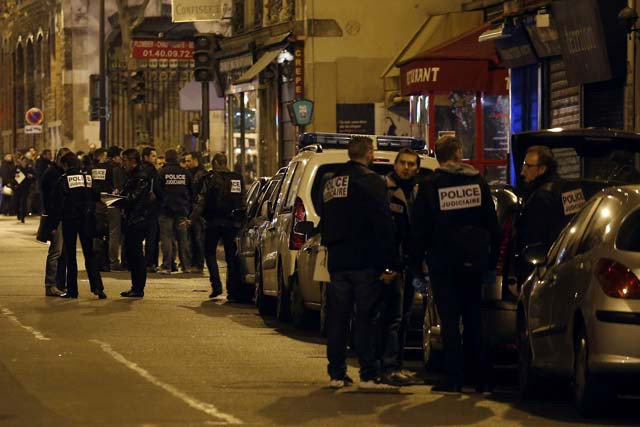The carnage in Paris
The attacks in Paris will be replicated, possibly many times, in coming years

The criminal police arrive at the site of an attack on Paris, near La Belle Equipe, rue de Charonne, on November 14, 2015 after a series of gun attacks occurred across Paris as well as explosions outside the national stadium where France was hosting Germany. PHOTO: AFP
The Islamic State (IS) has claimed responsibility for the attack, stating that France remains the “top target” for the group. The effects of these attacks are going to be more far-reaching and deeply felt than were the Charlie Hebdo attacks earlier in 2015. In that instance, the magazine was tightly targeted, but the latest incident was seemingly indiscriminate. A football stadium, sidewalk cafes and a concert hall, all places where people were going about their ordinary business and turned into butcher shops in seconds. There appear to be no survivors of the terrorist group, but the hunt will be quickly on for their support infrastructure.
Europe is, in broad terms, a soft target. The lack of internal border controls and the free movement of Europeans across borders make monitoring, even of those who have joined the fight in Syria on the IS side, logistically a virtual impossibility. Similarly, once weapons have been brought into the European Union (EU), they are easily moved around and no matter how alert security services are, they cannot (yet) read the minds of individuals. Self-radicalising terrorists with no formal link to any of the known mainstream terrorist organisations exist within all EU states. They are not on the ‘radar’ of the security services and so-called ‘marauding’ attacks such as this have long been expected and planned for. The UK held a large live exercise, simulating a similar scenario to that in Paris last summer.
France will now pass through a period of shock and mourning. There will be funerals in the coming week, and the ‘how’ and ‘what’ of the attacks will be clarified, if not the ‘who’ and ‘why.’ It is too early to say exactly what the consequences may be for France, the EU generally and the wider world, but border controls in EU states are likely to be heightened, and the days of the Schengen Agreement may be numbered. There could also be a reaction from far-right political groups, currently resurgent in France and Germany anyway, and it is entirely possible that there will be attacks on Muslim minority communities, especially if a link between the attackers and their religious identity is definitively established.
The attacks in Paris will be replicated, possibly many times, in coming years. No nation can be considered either safe or immune, and in a target-rich environment, the terrorists, whatever their motivation and whatever banner they march under, are always going to get under the radar, find sympathy and support, and a niche to wait in until they are ready to go about their deadly business. Funding for terrorist groups will continue at both a state and individual level and is unlikely to wane in the foreseeable future. The last decade has seen a change in the nature of the way that wars are fought, and Paris, London, Rome and New York are all on the front line. Expect more of the same.
Published in The Express Tribune, November 15th, 2015.
Like Opinion & Editorial on Facebook, follow @ETOpEd on Twitter to receive all updates on all our daily pieces.














COMMENTS
Comments are moderated and generally will be posted if they are on-topic and not abusive.
For more information, please see our Comments FAQ